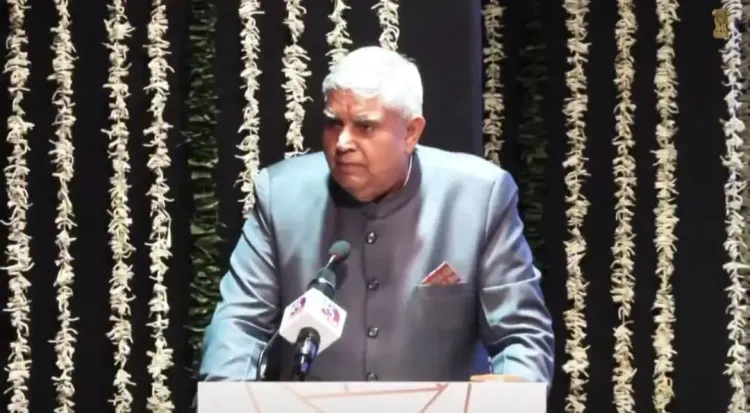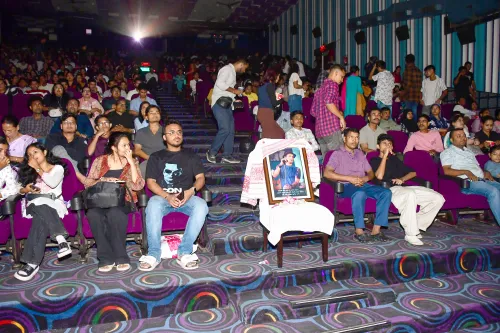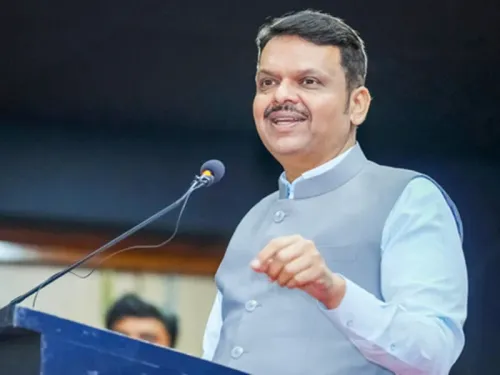India's People-Centric Policies Make it the World's Most Aspirational Nation: Vice President Dhankhar

Synopsis
Key Takeaways
- India is undergoing significant economic growth.
- People-centric policies are transforming India into an aspirational nation.
- Investment in education is crucial for future development.
- Philanthropy should be separate from commerce.
- Reviving historical institutions like Nalanda is essential.
Mumbai, March 1 (NationPress) Vice President Jagdeep Dhankhar stated on Saturday that India is currently experiencing an economic boom characterized by remarkable infrastructural advancements, extensive digitization, and significant technological integration, as the citizens of the nation have enjoyed the benefits of development over the past decade.
“People-centric policies have proven to be incredibly fruitful. This transformation has established India as the most aspirational nation worldwide at this time,” Dhankhar expressed during a ceremony celebrating 75 Years of KPB Hinduja College of Commerce.
“Today, India is the envy of the globe due to its Demographic Dividend,” he added.
He emphasized that corporate leaders should regard investments in education as more than just acts of philanthropy. “It represents an investment in our present, our future, and the growth of industry, commerce, and trade. Quality education is a precious gift, and we must strive for educational excellence,” remarked the Vice President. He pointed out that philanthropic initiatives should not be influenced by the ideologies of commercialization, stating, “Our health and education sectors are suffering from these issues.”
“Education is a shared responsibility between the government and the private sector. Those involved in industry, trade, and commerce must step up and prioritize education,” he noted.
He commended the Hinduja group for its contributions, mentioning that the group serves as an exemplary model by keeping philanthropy separate from commercial interests. The Vice President encouraged students to continue learning and to focus on self-directed education, stating that they are their own best educators.
Vice President Dhankhar remarked, “We have revered institutions like Odantapuri, Takshila, Vikramshila, Somapura, Nalanda, and Vallabhi. Scholars from all corners of the world gathered to gain and share knowledge. The thirst for knowledge was quenched. But what transpired around 1200 years ago? Nalanda, an ancient intellectual treasure of India, accommodated 10,000 students and 2,000 teachers in its nine-story building. What happened in 1193? Bakhtiyar Khilji, a ruthless destroyer of our culture, reduced our academic institution to ashes.”
He further stated, “For months, flames ravaged extensive libraries, reducing countless irreplaceable manuscripts on mathematics, medicine, and philosophy to ashes. This barbaric destruction was not merely architectural; it marked the systematic obliteration of centuries of knowledge.”
He urged parliamentarians and thought leaders to utilize every moment of this century wisely. “We must strive to revive institutions like Nalanda, preserving our intellectual heritage, which is crucial for achieving the vision of Viksit Bharat by 2047. We cannot afford to succumb to narratives from those who oppose the very existence of Bharat,” he asserted.
The Vice President announced that the Indian Council of World Affairs, which he leads, will soon establish a Memorandum of Understanding (MoU) with KPB Hinduja College of Commerce, stating that this agreement will be finalized within the next two months. “The MoU will provide exposure to global events, and influential global figures will leave their marks here,” he added.
He proposed the creation of a confederation of alumni associations, which could significantly influence the development of sectoral policies within the government. “This convergence of talent is an invaluable resource for the government. It can illuminate policy pathways,” he remarked.









